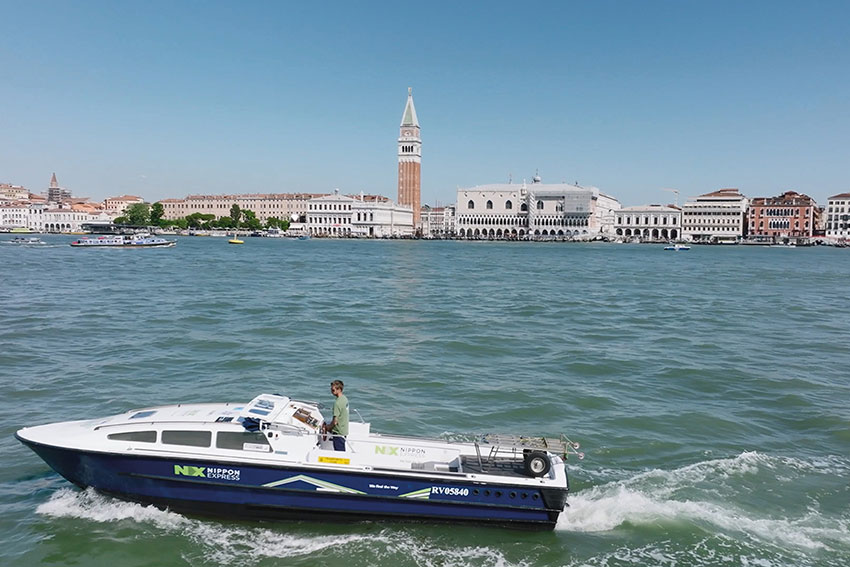Unparalleled service helps Nippon Express expand the global logistics field.

“In any situation we seek out the single best way and make it reality.”
Mitsuru Saito, President, NIPPON EXPRESS HOLDINGS, INC.
Though established in 1937, the Nippon Express Group’s roots date back to 1872, evidence of a rich history, which, according to company president Mitsuru Saito, has been essential to the firm’s continued success, enabling it to take a flexible, proactive response to change.
Now the Nippon Express Group (hereinafter referred to as Nippon Express) is bringing its trademark flexibility to a logistics industry that has been severely disrupted in recent times. Traditionally, Mr. Saito explains, disruptions have been “largely limited to geopolitical tensions and natural disasters”. These days, however, new factors have been come into play.
Among others, Mr. Saito cites the Ukraine-Russia conflict and the global pandemic, which have caused experts to highlight the need for companies to diversify Asian trade routes.
Regarding the latter, with customers reviewing their supply chains as a matter of course, Japan could find itself ideally placed to step into the breach. Mr. Saito takes up the thread: “Located halfway along the Pacific route between Southeast Asia and North America, Japan has the geopolitical advantages to play the role of a relay hub base.”
Developing a globally competitive logistics hub would mean creating flexible operations by prioritizing certain key locations, for example by reimagining the role of some of Japan’s ports, of which, thanks to the country’s island status, there is no shortage.
Perhaps it is within this wider context that Nippon Express has chosen to reimagine its own role in the industry, with a new company holding structure and branding overhaul to mark the change.
Mr. Saito adds: “Conventionally our perspective has been from Japan and for Japan, but by converting ourselves into a holding company, we will be able to plan a global business strategy, creating synergies between Nippon Express in Japan and its overseas subsidiaries.”
Another advantage of transitioning to a holding company is that it brings greater clarity, an overarching structure that allows for more efficient business restructuring and the acceleration of M&A processes, not to mention the ability to streamline underperforming departments.
The decision to change the company branding, meanwhile, is best viewed as an extension of the Nippon Express’ desire to focus on the overseas market. The previous logo, a traditional Kanji mark, might have been popular and well-known but, with the group aiming to increase its international sales ratio to 50%, a new brand image positioning Nippon Express as a global player makes perfect sense.
For Mr. Saito, the new brand image, along with the relocation of the head office, are emblematic of the company’s evolution. The transformations are “a testiment to the fact that everything can be changed”, an attitude that is also reflected in its willingness to embrace DX technologies as the group has recently forged an alliance with NEC Corporation.
One of the very few global logistics companies that can independently provide air, sea and land transportation, the group has been actively striving to reduce its environmental footprint for years and the goal of reducing CO2 emissions by 30% compared to 2013 will be achieved in 2023.
Eco-friendly vehicles - hybrid, electric or LPG fueled - are being introduced, and warehouse lighting is being converted to LED. Moreover, Nippon Express recently launched an eco-friendly delivery service in Venice, Italy using hydrogen-powered boats. The group has also planted over 10,000 trees as part of its annual tree-planting initiative.
Looking to the future, Nippon Express has identified several key industries in its business plan.
Having already established a global network for logistics in the pharmaceutical industry, the company has chosen to concentrate its immediate focus on the semiconductor industry, which is undergoing a global production shift. The shift has provided Nippon Express with an opportunity to establish a warehouse in Phoenix, where the U.S. is currently increasing its output, with Taiwan as another potential target.
Though supply chains in the semiconductor industry remain complex, Mr. Saito is optimistic that new business opportunities can be created by providing a platform service offering comprehensive solutions for semiconductor-related logistics. In the meantime, the group will maintain its focus on the pharmaceutical, electrical and electronic, automobile and apparel industries.
Pressed on his legacy, Mr. Saito highlights the importance of changing the mindset of company employees, emphasizing that Nippon Express is a “new company”, ready to confront its future and pursue innovative ways of thinking.
“Of course, being highly regarded by our customers and increasing the price of our shares is important,” Mr. Saito concludes, “but, more than that, I want our employees to feel satisfaction and happiness working for Nippon Express.”
0 COMMENTS